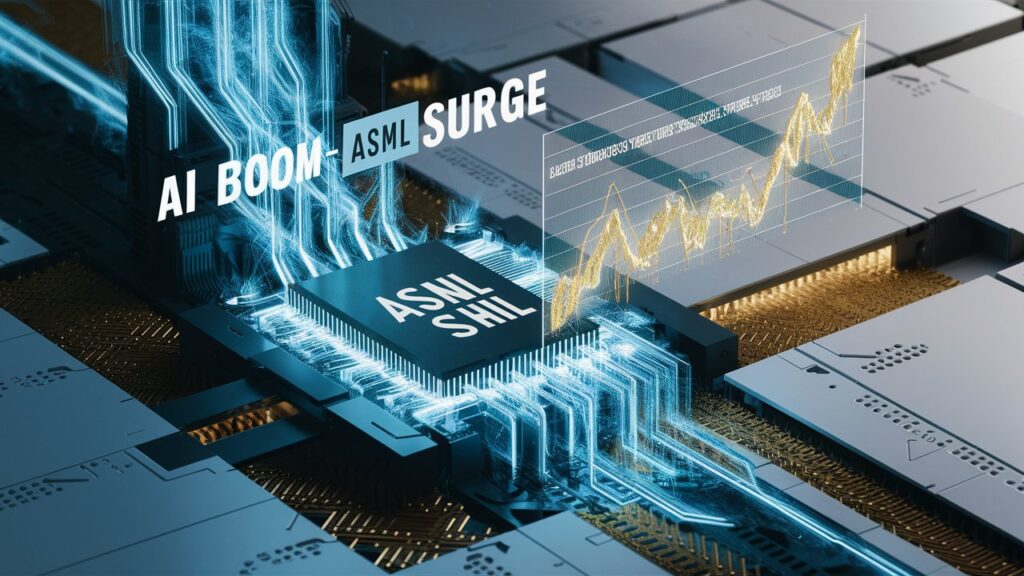ASML’s Q2 2024 Performance
ASML, a key player in the semiconductor industry, has reported impressive Q2 earnings, driven by AI demand and global chip production. The company’s strong performance has been attributed to the increasing demand for advanced AI technologies in various sectors, including tech, healthcare, and automotive. Furthermore, ASML has also benefited from the global chip production ramp-up to meet the growing demand for electronic devices. In addition, the recent kraneShares AI ETF launch has contributed to the positive sentiment surrounding AI-related technologies, further boosting ASML’s prospects in the semiconductor market.
💰 Exceeding Expectations
Net income of €1.6 billion on revenues of €6.2 billion, surpassing analysts’ expectations.
📈 AI-Driven Growth
New bookings rise sharply to €5.6 billion, fueled by robust sales in China and AI chip demand.
🌐 Global Chip Dynamics
Performance amid U.S.-China tensions and export restrictions, with pressure to limit chip technology sales to China.
🔮 Future Outlook
CEO describes 2024 as a ‘transition year’ before a strong 2025, attributing growth to AI advancements.
📊 Stock Performance
ASML’s stock has increased by 49.00% year-to-date in 2024.
ASML’s strong performance underscores its pivotal role in the global semiconductor industry and the growing influence of AI technology.
ASML’s Q2 Earnings Surge: AI Demand Drives Chipmaking Equipment Sales

In the rapidly advancing world of technology, few companies hold as much sway over the future of computing as ASML, the globe’s premier supplier of chipmaking equipment. On July 17, 2024, ASML made headlines with its second-quarter earnings announcement, showcasing a remarkable profit of 1.94 billion euros—a figure that surpassed market expectations and sent ripples through the tech industry. This financial triumph isn’t just a win for ASML; it’s a barometer for the entire semiconductor sector and, by extension, the burgeoning field of artificial intelligence (AI).
The Power of Chipmaking in the AI Era
ASML’s success story is intricately tied to the insatiable appetite for advanced chips that power AI technologies. As we stand on the cusp of an AI revolution, the demand for sophisticated semiconductors has skyrocketed, placing ASML at the epicenter of this technological storm.
Breaking Down ASML’s Q2 Performance
Let’s dive into the numbers that have the tech world buzzing:
- Revenue: 6.90 billion euros
- Net Profit: 1.94 billion euros
- Performance: Exceeded analyst expectations
While these figures show a slight dip from the previous year, they’re still impressive given the current economic climate. The real story, however, lies in the surge of new orders, driven primarily by the AI boom.
The AI Factor: Fueling Demand and Growth
The correlation between AI advancements and ASML’s financial health is undeniable. As companies race to develop and deploy AI technologies, the need for cutting-edge chips has never been greater. This demand is reflected in ASML’s order books, which have seen a significant uptick.
Why AI Needs Advanced Chips
- Processing Power: AI algorithms require immense computational capabilities.
- Energy Efficiency: Advanced chips offer better performance with lower power consumption.
- Miniaturization: Smaller, more powerful chips enable AI integration in a wider range of devices.
Market Implications and Future Outlook
ASML’s strong performance sends a clear signal: the tech sector remains robust despite broader economic concerns. This resilience is largely attributed to the ongoing investments in AI infrastructure across various industries.
Competitive Landscape
ASML’s position as the leading supplier of chipmaking equipment gives it a unique advantage in the market. With few competitors able to match its technological prowess, ASML is well-positioned to capitalize on the growing demand for AI-capable chips.
Challenges on the Horizon
Despite the positive outlook, ASML faces several challenges:
- Market Volatility: Global economic uncertainties could impact future performance.
- Geopolitical Tensions: Trade restrictions and technology export controls pose potential risks.
- Dependency on AI Demand: An overreliance on AI-driven growth could be problematic if the sector faces a slowdown.
The Ripple Effect: ASML’s Impact on AI Development
ASML’s success doesn’t exist in a vacuum. Its ability to produce advanced chipmaking equipment directly influences the pace of AI innovation. Let’s explore how ASML’s performance could shape the future of AI:
Accelerating AI Research and Development
With access to more powerful chips, AI researchers can:
- Train larger, more complex models
- Process vast amounts of data more efficiently
- Explore new AI applications previously limited by hardware constraints
Democratizing AI Technology
As chip production scales up, we may see:
- More affordable AI-capable devices
- Wider adoption of AI in small and medium-sized businesses
- Increased integration of AI in everyday consumer products
Pushing the Boundaries of AI Capabilities
Advanced chips could lead to breakthroughs in:
- Natural language processing
- Computer vision
- Autonomous systems
- Quantum computing integration with AI
Expert Insights: The Long-Term View
While ASML’s earnings paint a rosy picture for the immediate future of AI, some experts urge caution and foresight. Eliezer Yudkowsky, a prominent figure in AI ethics and part of an “AI Futures” group, emphasizes the importance of considering the long-term implications of rapid AI advancement.
“As we celebrate technological progress, we must also redouble our efforts to ensure AI development aligns with human values and long-term societal benefits.” – Eliezer Yudkowsky
This perspective highlights the need for responsible innovation as we push the boundaries of AI capabilities.
The Global Impact of ASML’s Success
ASML’s performance has far-reaching consequences beyond the tech sector:
Economic Implications
- Job Creation: Increased demand for skilled workers in semiconductor and AI industries
- Investment Attraction: Tech hubs may see a surge in foreign and domestic investments
- Innovation Ecosystems: Growth of supporting industries and startups around AI and chip manufacturing
Geopolitical Considerations
- Tech Sovereignty: Nations may intensify efforts to secure domestic chip production capabilities
- International Collaboration: Potential for increased partnerships in AI research and development
- Regulatory Challenges: Governments may introduce new policies to manage AI’s rapid growth
Preparing for an AI-Driven Future
As ASML’s success propels the AI industry forward, individuals and businesses must adapt to stay relevant. Here are some strategies to consider: Investing in education and upskilling can help individuals stay competitive in an evolving job market, while businesses can leverage cutting-edge technologies to optimize operations. For example, companies can utilize platforms like eBay AI advertising tools to enhance targeted marketing strategies, reaching the right audience with greater efficiency. By staying agile and embracing innovation, both individuals and businesses can thrive in this rapidly changing landscape.
- Skill Development: Focus on AI-related skills such as machine learning, data analysis, and AI ethics
- Business Adaptation: Explore ways to integrate AI into existing business models and processes
- Ethical Considerations: Stay informed about AI ethics and contribute to responsible AI development
- Investment Opportunities: Consider the potential of AI-related investments in your portfolio
- Continuous Learning: Keep abreast of AI advancements and their potential impacts on your industry
The Road Ahead: Challenges and Opportunities
While ASML’s Q2 earnings paint an optimistic picture, the path forward is not without obstacles. Here’s a balanced view of what lies ahead:
Opportunities
- Technological Leaps: Potential for groundbreaking AI applications in healthcare, climate science, and more
- Economic Growth: AI-driven productivity gains across various sectors
- Quality of Life Improvements: AI assistants and smart technologies enhancing daily life
Challenges
- Ethical Concerns: Ensuring AI development respects privacy, fairness, and human rights
- Job Market Disruption: Potential displacement of certain jobs due to AI automation
- Security Risks: Increased need for robust cybersecurity measures as AI systems become more prevalent
Conclusion: Navigating the AI-Powered Future
ASML’s impressive Q2 earnings are more than just numbers on a balance sheet—they’re a testament to the unstoppable momentum of AI technology. As we witness the dawn of a new era in computing power, it’s clear that the ripple effects will touch every corner of our lives.
For businesses, the message is clear: adapt or risk being left behind. For individuals, it’s an opportunity to embrace new skills and perspectives. And for society as a whole, it’s a call to engage in thoughtful dialogue about how we want AI to shape our future.
As we move forward, let’s harness the power of AI responsibly, ensuring that technological progress aligns with human values and societal well-being. The future is bright, powered by chips that are smaller, faster, and more capable than ever before—and ASML is leading the charge into this exciting new frontier.
Stay curious, stay informed, and be part of the conversation that will shape our AI-driven world. The revolution is here, and it’s etched in silicon.
What are your thoughts on ASML’s role in advancing AI technology? How do you see AI impacting your industry or daily life? Share your perspectives and join the discussion on the future of AI and chip manufacturing.







